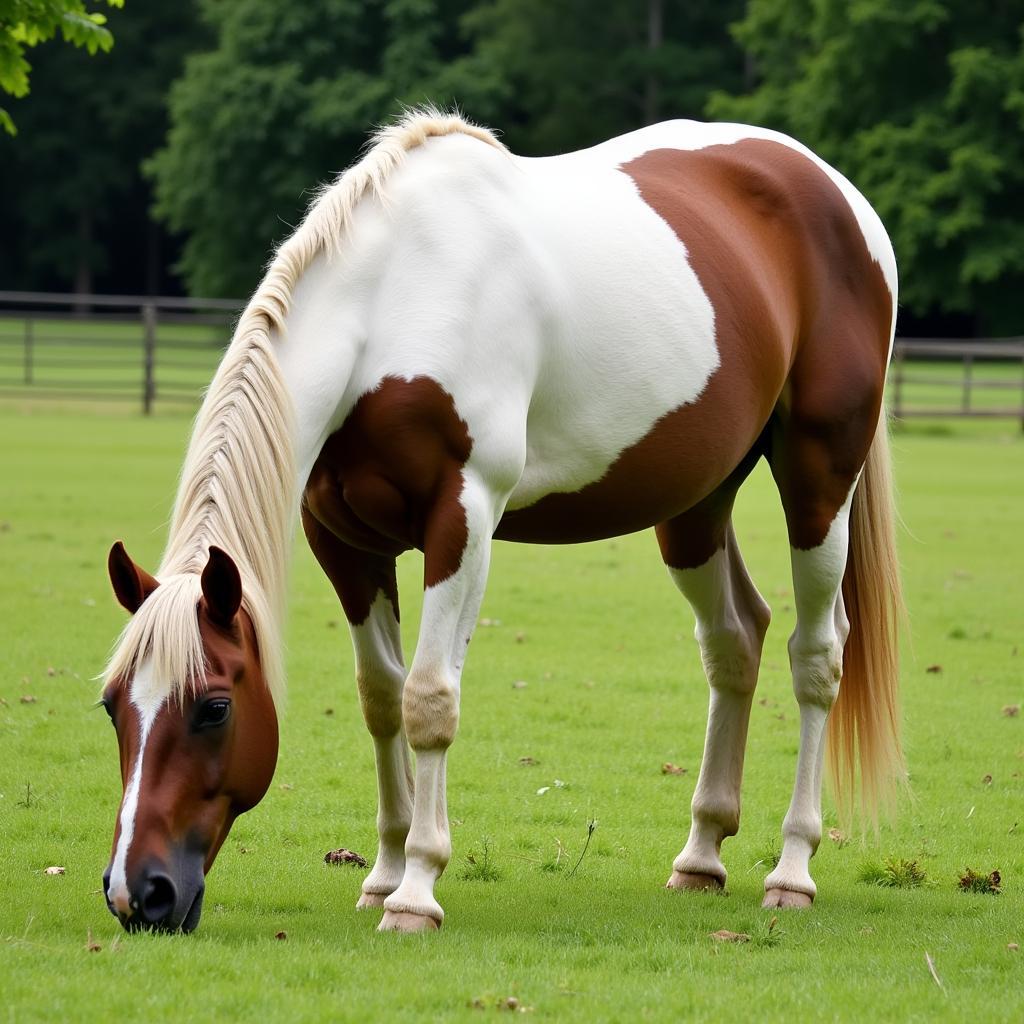You might associate the phrase “snap crackle pop” with a delicious breakfast cereal, but did you know it’s also sometimes used to describe sounds coming from your horse’s joints? While not as appetizing as Rice Krispies, these sounds can be a cause for concern for horse owners.
Deciphering the Sounds: What’s Normal, What’s Not
It’s important to remember that not all joint sounds are created equal. Just like our knees might crackle when we stand up, horses can experience benign joint noises, especially as they age or during certain movements. This is often due to the formation of small gas bubbles in the synovial fluid, the lubricating fluid within the joint. These pops are generally nothing to worry about, especially if your horse shows no signs of discomfort or lameness.
However, other sounds, like a distinct snapping or grinding, could indicate a more serious underlying issue. These sounds might be associated with:
- Osteoarthritis: A degenerative joint disease that affects cartilage and bone, often causing pain and stiffness.
- Ligament or Tendon Injuries: Damage to these soft tissues can create audible pops or snaps, especially during movement.
- Developmental Orthopedic Diseases: Young horses are particularly susceptible to conditions like osteochondrosis (OCD), which can involve abnormal bone or cartilage development within joints, leading to snapping or crackling sounds.
When to Call the Vet: Signs Your Horse Needs Attention
While occasional joint noises might be normal, it’s crucial to be vigilant and recognize when those sounds warrant professional attention. Contact your veterinarian immediately if you notice any of the following:
- Lameness or Difficulty Moving: Any reluctance to move, limping, or change in gait could indicate pain and requires immediate veterinary assessment.
- Swelling or Heat in the Joint: These signs often accompany inflammation and could be a symptom of injury or disease.
- Persistent or Worsening Sounds: If the snapping, crackling, or popping sounds become more frequent, intense, or are accompanied by other symptoms, seek veterinary advice promptly.
- Behavioral Changes: A sudden change in your horse’s temperament, such as increased irritability, reluctance to be touched, or signs of pain, should not be ignored.
Proactive Care: Keeping Your Horse’s Joints Healthy
Prevention is always better than cure. While you can’t completely eliminate the risk of joint issues in horses, you can take proactive steps to support their joint health:
- Provide a Balanced Diet: Ensure your horse receives a balanced diet with appropriate vitamins and minerals, particularly those that support joint health, like glucosamine and chondroitin.
- Maintain a Healthy Weight: Excess weight puts additional stress on joints, increasing the risk of injury and degenerative conditions.
- Implement a Gradual Warm-Up and Cool-Down Routine: Always allow ample time for your horse to warm up before exercise and cool down afterward. This helps prepare the joints for activity and reduces the risk of strain.
- Choose Suitable Riding Surfaces: Avoid riding on hard, uneven, or slippery surfaces that can put undue stress on joints.
- Schedule Regular Veterinary Check-ups: Routine veterinary exams, including lameness evaluations, can help detect early signs of joint problems and allow for timely intervention.
 Healthy Horse Grazing Pasture
Healthy Horse Grazing Pasture
Your Horse’s Well-being is Our Priority
By understanding the potential causes of “snap crackle pop” sounds in horses and recognizing the warning signs of a problem, you can make informed decisions about your horse’s care. Remember, early detection and intervention are key to managing joint issues and ensuring your equine companion enjoys a long, healthy, and active life.
Frequently Asked Questions about “Snap, Crackle, Pop” in Horses
Q: My horse’s knees crack sometimes when he gets up. Should I be worried?
A: Occasional cracking sounds, especially in older horses or during specific movements, are not necessarily a cause for concern. However, if you notice any lameness, swelling, or changes in your horse’s gait, consult your veterinarian.
Q: What can I do to prevent joint problems in my young horse?
A: Providing a balanced diet, maintaining a healthy weight, and implementing a gradual warm-up and cool-down routine can all contribute to healthy joint development.
Q: Are there any supplements that can help my horse’s joints?
A: Consult with your veterinarian about joint supplements containing glucosamine, chondroitin, or hyaluronic acid, which may provide additional support.
Q: Is it normal for my horse’s joints to make noise after a period of rest?
A: Some horses might experience mild stiffness or joint noises after a period of rest. This is often temporary and resolves with movement. However, persistent or worsening sounds should be investigated.
Q: What are the treatment options for arthritis in horses?
A: Treatment for arthritis in horses varies depending on the severity and may include pain management, joint support supplements, physical therapy, and in some cases, surgery.
Need More Help?
For all your equine care needs and expert advice, don’t hesitate to contact us!
Call: 0772127271
Email: [email protected]
Visit Us: QGM2+WX2, Vị Trung, Vị Thuỷ, Hậu Giang, Việt Nam
Our dedicated team at Justus Horses USA is available 24/7 to answer your questions and provide exceptional care for your equine companions.